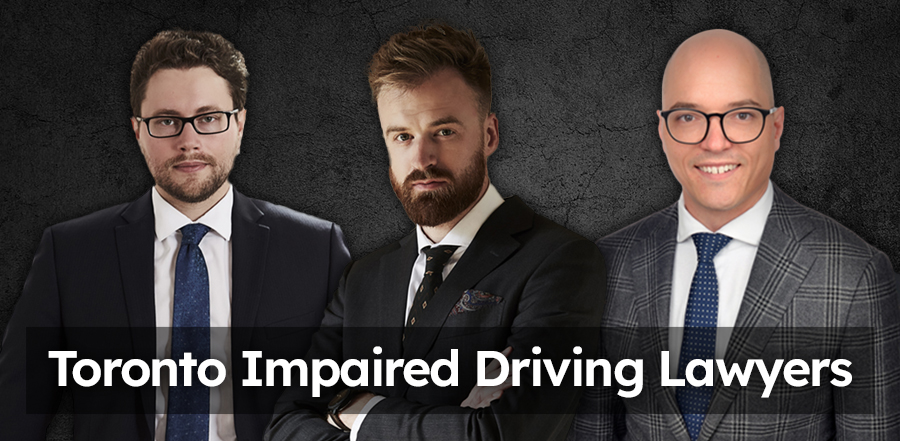Impaired Driving Lawyers in Toronto
Impaired Driving, or Driving Under the Influence (DUI), is found under s.320.14 of the Criminal Code.
A person may be charged with a DUI if they are found operating a vehicle, vessel, or aircraft while under the influence of alcohol or drugs, thereby impacting their ability to drive. Charges can occur regardless of whether the vehicle is in motion. If the vehicle was operational and an individual was under the influence of alcohol or drugs, it can be established that there was a risk of the vehicle imposing a danger to others.
Offences such as these can be classified as hybrid offences, that is, they are either summary or indictable depending on how the Crown interprets the circumstances of every individual case. The punishments given under these charges depend on a few factors, with punishments ranging from as low as 2 years imprisonment to as high as life imprisonment. The various factors considered by the Courts for determining punishments will be considered below.

Key Takeaways
- The severity of impaired driving offences is subject to whether an individual is charged under a summary offence or an indictable offence.
- An individual may face incarceration for impaired driving, ranging from between 2 years to life imprisonment.
- When determining bail conditions for individuals charged under DUI, the Courts apply the ladder principle in which the least restrictive conditions are applied unless the Crown can prove otherwise. These conditions are subject to the individual circumstances of each case.
- Most bail conditions for impaired driving involve driving prohibitions, however, it is important to note that under the Canadian constitution, every accused individual has the right to a reasonable bail.
- Impaired driving charges can be beaten. Contact a criminal defence lawyer for assistance in determining the best strategy for you.
How can an impaired driving lawyer in Toronto help?
Navigating the criminal justice system can be daunting for an individual, which is why hiring a criminal defence lawyer is paramount. Hiring a criminal defence lawyer has many benefits. Firstly, a lawyer can provide precharge legal advice so you know your legal rights and options. A lawyer can also protect you from self-incrimination by providing important guidance on how to handle your conversations with law enforcement
When you hire a lawyer, they will be dedicated to aiding you in beating the charge. A lawyer will know how to build you a stronger case by gathering evidence, interviewing witnesses, retaining expert witnesses where necessary, and representing you during trial. Lawyers also have a wide range of experience with navigating the criminal justice system and the court process; therefore, a lawyer will be able to answer any questions you may have regarding the process.
Impaired Driving Charge in the Criminal Code of Canada
Impaired Driving charges are found under Section 320.14 of the Criminal Code of Canada, as highlighted below. Section 320.14 criminalizes the operation of any conveyance while under the influence of alcohol or drugs, with punishments varying based on factors such as severity and consequences of the offence.
Examples of Impaired Driving Charges
Some examples of an impaired driving charge may include the following:
- Drunk driving;
- Driving while smoking marijuana;
- Driving with a blood alcohol concentration (BAC) of 0.08 or higher;
- Driving while under the influence of prescription medications that impact your driving ability
Impaired Driving Charge Defences
Every case is unique. The strength and validity of any defence rely upon the specific facts of each case. It depends on the evidence provided and specific allegations against you. There are many, if not hundreds of defences that can be applied to DUI charges. The following is an outline of the most common defences that can be applied to counter an Impaired Driving charge.
- Police adherence to procedures: There are many instances in which the police may fail to adhere to proper procedures, such as when collecting evidence, which may result in you not being guilty. For example, if it is found that the police fail to maintain the device used for breath samples, it demonstrates they failed to adhere to proper procedures. This in turn shows a failure to collect proper evidence and a violation under the Charter of Rights and Freedoms may arise as every individual is protected from unreasonable search and seizure.
- Unlawful reason for a traffic stop: This defence to Impaired Driving occurs when the police pull you over for an unlawful reason. In Canada, you can be pulled over by the police to conduct a license, insurance, mechanical fitness, and sobriety of the driver check. Any reason other than those listed constitutes an unlawful reason for a traffic stop. For example, if you are pulled over by the police over speculation that you are involved in criminal activity, any evidence of impaired driving will be deemed impermissible in court if it is found that there was no evidence in support of this “hunch.”
- Any applicable Charter defences: The Charter of Rights and Freedoms outlines an individual’s rights and freedoms before and after their arrest. If at any time the police use excessive or unreasonable force, a violation of section 7 of the Charter may arise.

What are the consequences of an Impaired Driving charge?
Impaired Driving charges are hybrid offences, that is, they can be classified as either a summary or an indictable offence.
If the charge is classified as an indictable offence, impaired driving can result in up to 10 years of imprisonment. If the impaired driving caused bodily harm to another, there can be up to 14 years of imprisonment. If death is caused by impaired driving, the consequence can be up to life imprisonment.
If the charge is classified as a summary offence, there can be up to 2 years of imprisonment for impaired driving, regardless of whether bodily harm was caused.
In addition to the above, all impaired driving charges also have mandatory minimum punishments regardless of whether they are summary or indictable offences, as outlined below:
- The first offence will consist of a $1,000.00 fine;
- The second offence will consist of 30 days imprisonment;
- The third offence will consist of 120 days imprisonment.
If your breath sample consists of a high blood alcohol concentration, additional fines are applicable as outlined below:
- A BAC between 120 mg to 160 mg of alcohol in 100 mL of blood: $1,500 minimum fine
- A BAC greater than 160 mg of alcohol in 100 mL of blood: $2,000 minimum fine
Other factors, such as bodily harm, death, street race participation, and operation of a large motor vehicle, are also considered by the Courts when determining fines and jail sentences and can lead to an increase in the penalties for Impaired Driving.
Impaired Driving Charge Investigation
In order to determine the level of guilt, an investigation into an Impaired Driving charge considered both the actus reus and mens rea of the offence.
Actus reus and mens rea are Latin terms meaning guilty act and guilty mind.
To prove actus reus the accused must be operating a vehicle while impaired by drugs or alcohol, or have or surpass a blood concentration level of 0.08. This is the physical act of committing the offence and the police may use various roadside tests or breath samples to prove this. Further blood and urine samples may also be used to obtain evidence of drug impairment.
To prove mens rea the accused must knowingly or willingly have operated the vehicle while impaired or with a blood concentration level of or exceeding that that is acceptable.
Bail Conditions for Impaired Driving Charges
As stated above, under the Canadian constitution, every accused individual has the right to a reasonable bail.
Clients can work with their lawyers to build a bail plan, allowing the accused to obtain bail if they are punished with incarceration. Most bail conditions revolve around driving prohibitions or license restrictions/suspension. The restrictions imposed by the bail conditions are important to follow. Failure to adhere to your bail conditions may result in further criminal charges arising against you.

Frequently Asked Questions About Theft
Will an impaired driving charge show on my criminal record?
Impaired driving is a criminal offence, and therefore if you are convicted then it will likely show on your criminal record. If you are not convicted then the charge will still likely be in the police database.
How long does an impaired driving case take?
The length of an impaired driving case depends largely on the facts of the case, as well as how many cases the court is dealing with. Often, a shorter case will be resolved within a few months, and longer cases may take a year or more to resolve.
Can I travel while an impaired driving case is ongoing?
Certain bail conditions may prohibit travel but this is largely dependent on specific circumstances surrounding your case. Typically, you will be able to travel so long as it is not a bail condition.
Can I go to jail for impaired driving?
Depending on how the case proceeds and if it is pursued as an indictable or summary offence then imprisonment can result. The specific circumstances surrounding the case will also affect this. If pursued as an indictable offence then the maximum sentence varies from 10 years for impaired driving, 14 years for bodily harm caused by impaired driving, and life imprisonment for death caused by impaired driving. If pursued as a summary offence then incarceration for not more than 2 years less a day can result.
Do I have to tell my employer about impaired driving charges?
If you are convicted of an impaired driving charge, then it will be on your criminal record which is available to employers if they conduct criminal background checks. However, if you are unable to fulfil your job duties, due to a possible suspended license then it is advisable to inform your employer.
Will I lose my license from impaired driving charges?
If impaired driving charges are laid against you, you may find yourself with a suspended license, among other potential penalties. The precise duration of your license suspension may vary depending on the factors of your case, however, you can get your license back if charged with impaired driving.
Related Offences
- Failing to Stop for Police: Failing to stop for police is a charge that may be applied to drivers should they refuse to stop for the police. This offence often correlates with other criminal driving offences like impaired driving as, for example, an impaired driver may not stop for the police.
- Impaired Driving: Impaired driving is an offence that involves being in control of a vehicle while you are either intoxicated by drugs or alcohol, your blood-alcohol level is above the legal limit or you fail to provide a breath sample.

a senior criminal defence lawyer and managing partner of Strategic Criminal Defence.





